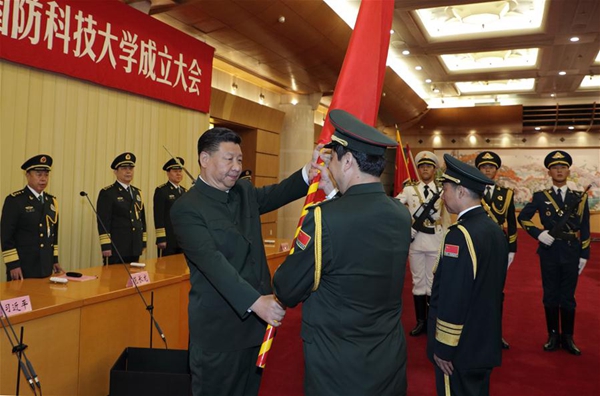Jiang Jianguo addresses seminar on China.org.cn program
A seminar was held in Beijing on July 18 to share the successful experience of an online short video program named “China Mosaic.” Jiang Jianguo, vice minister of the Publicity Department of the Central Committee of the Communist Party of China and minister of the State Council Information Office (SCIO), attended and addressed the seminar. Guo Weimin, vice minister of the SCIO, hosted the seminar.
|
Jiang Jianguo, vice minister of the Publicity Department of the Central Committee of the Communist Party of China and minister of the State Council Information Office, addresses the seminar on a China.org.cn program in Beijing on July 18. [Photo/China.org.cn] |
The serial program “China Mosaic” is an English-language commentary on global news, often offering Chinese perspective. It is produced by China.org.cn, a Beijing-based website offering news and information service in 10 languages.
In his speech, Jiang spoke highly of the program, saying that China.org.cn has shouldered the responsibility towards the nation and the people and produced an influential program. He summarized the reasons for the success of the program, saying that China.org.cn has not only equipped itself with innovative capabilities through proactive agenda-setting and condensing the content into three-minute programs, but also cultivated talent to lead and promote the related work. Jiang encouraged China.org.cn to keep improving the program and explore the regular patterns of online international communication.
Concerning how to promote international communication, Jiang emphasized proactive agenda-setting, the use of the internet and mobile internet as well as the production of signature programs.
Zhang Fuhai, president of China International Publishing Group (CIPG), which is the parent company of China.org.cn, stressed the importance of international communication and CIPG’s support of the program. He said that international communication is the blood of CIPG, and while continuing to support the program, CIPG will increase its capability of international communication.
Wang Xiaohui, editor-in-chief of China.org.cn and host of the program, introduced the practice and experience in producing the program. Wang said that the achievements of the program can be attributed to the use of English (modern day lingua franca), the effect-oriented principle, the emphasis on facts and opinions, the story-telling pattern, and the serial structure. He pledged that China.org.cn will continue to promote international communication.
The program “China Mosaic” was launched by China.org.cn in May 2015, and 116 videos have been produced during the past two years. By far, the program has been watched for 227 million times, the videos have been played for over 16.95 million times, and the interaction among the audience has reached 1.27 million times.
![Jiang Jianguo, vice minister of the Publicity Department of the Central Committee of the Communist Party of China and minister of the State Council Information Office, addresses the seminar on a China.org.cn program in Beijing on July 18. [Photo/China.org.cn] Jiang Jianguo, vice minister of the Publicity Department of the Central Committee of the Communist Party of China and minister of the State Council Information Office, addresses the seminar on a China.org.cn program in Beijing on July 18. [Photo/China.org.cn]](http://images.china.cn/attachement/png/site1007/20170720/7427ea21094f1ada66420d.png)


